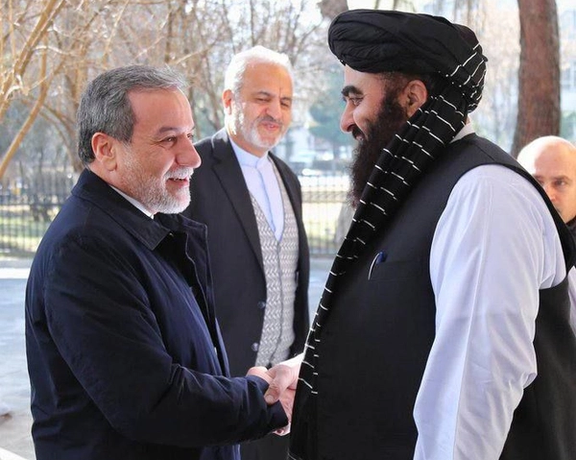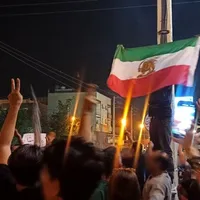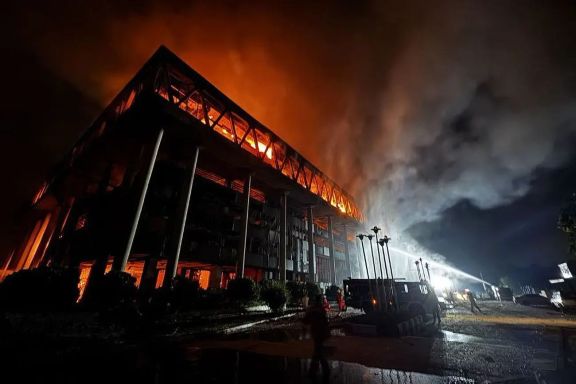Hajizadeh was the face of Iran’s missile and drone program. He wasn’t its architect, but its courier. His image, projected through ceremony and spectacle, became central to the Islamic Republic’s projection of power.
That changed five years ago.
On January 8, 2020, two missiles, fired seconds apart, tore through a Ukrainian passenger jet departing Tehran. One hundred seventy-six lives were lost—students, children, newlyweds, entire families.
The next day, Hajizadeh appeared on television, standing before the flags of Iran’s regional allies and praising a missile strike on a US base in Iraq—launched in response to the killing of Qasem Soleimani days earlier.
He spoke with pride, smirking as if a massacre had not just unfolded under his command.The IRGC admitted to downing the plane three days later.
Hajizadeh resurfaced, blaming a lone operator. No resignation. No remorse. The gap between his initial celebration and later deflection said more than either moment alone.
In the years that followed, truth remained elusive. Families were silenced. One father recalled being told by a senior commander that if the plane had not crashed, Iran and the US might have gone to war, and “ten million could have died.”
Few admissions made the intent more legible: the passengers may have been a human shield against retaliation.
A reckoning by other means
For families of PS752, Hajizadeh’s killing brought a wave of raw emotion—grief laced with a private sense of justice. Their motto had always been: Never Forget, Never Forgive.
They had waited not for revenge, but for truth. For the day a free court would summon him by name. That day never came. The reckoning arrived by other means.
Hamed Esmaeilion, who lost his wife and nine-year-old daughter, Reera, responded to the news with words shaped by fury and mourning. He recalled Hajizadeh’s defense: “the operator had ten seconds to decide.”
That moment, Esmaeilion said, sealed Hajizadeh not as a soldier, but as a custodian of a lie. “You are dead,” he wrote, “but our hatred of you, dead and alive, will live on in history.”
For Esmaeilion and others, Hajizadeh’s death may have closed a chapter, but not the book—not before the eyes of his daughter Reera, now etched in the national memory as a symbol of innocence lost.
Javad Soleimani, who lost his wife that same morning, wrote that while there was relief, there was also regret: “Standing eye to eye with Hajizadeh was a wish that never came true.”
The feeling echoed in Meghdad Jebelli, whose nephew was killed aboard PS752.
“Regret was added to all the regrets of my life,” he said—not seeing Hajizadeh “in a prison uniform and handcuffs, standing in a righteous court.” Still, he admitted, the feeling was “sweeter” than any regret before it.
As news of Hajizadeh’s killing spread, many families posted joyful clips of their loved ones—glimpses of life reclaimed against the void left by the IRGC’s system of violence.
A legacy built on bluster
Hajizadeh had projected strength, but his record told a different story.
He postured as a man firm against enemies, but often struck the powerless. He softened when under pressure, as when he downplayed the US base strike, insisting it was symbolic and not meant to kill.
The man who smirked as families wept, who lied as bodies burned, is no more.
The house of cards he built—missiles, drones, staged power—collapsed with him. He never stood before Esmaeilion, Soleimani, Jebelli, or the nation’s eyes to face the public humiliation that real justice brings.
Still, the justice dealt in the rubble, though imperfect, carried its own humiliation.One journalist wrote she hoped he lived for “three minutes and forty-two seconds”—the time it took PS752 to fall from the sky.
For the families, it may have offered a moment of healing. But the wound will not close until the truth behind the tragedies under his command is brought to light—and the system that created him is confronted in full.






